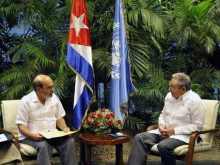
FAO Director-General praises Cuba’s advances in the fight against hunger

Cuban President Raúl Castro Ruz (right) meets with FAO Director-General
4 May 2013, Havana - FAO Director-General José Graziano da Silva has acknowledged Cuba's efforts to ensure the food security of its population at a meeting on Friday with President Raul Castro. He invited the President to a ceremony marking the achievement during FAO's governing Conference in Rome next month.
"Cuba is one of the 16 countries of the world which have already reached the 1996 World Food Summit's goal of halving the total number of their undernourished. This was made possible by the priority the government has set on ensuring the right to food and the policies it has implemented," said Graziano da Silva, on his first visit to the island since he took office in January 2012.
Cuba's food security is today similar to that of developed countries, with malnutrition affecting less than 5 per cent of the population. All the countries to have achieved the Summit's goal before the 2015 deadline will receive a certificate recognizing their achievement at a ceremony on June 16 in Rome.
The countries to have reached the goal are: Armenia, Azerbaijan, Chile, Cuba, Fiji, Georgia, Ghana, Guyana, Nicaragua, Peru, Samoa, Sao Tome and Principe, Thailand, Uruguay, Venezuela and Viet Nam.
Eradicating hunger The next FAO Conference is also set to approve an important change in FAO's Strategic Framework, making its first Strategic Objective no longer the reduction but the eradication of hunger, food insecurity and malnutrition.
Graziano da Silva noted that former Cuba President Fidel Castro was one of the first to champion that goal, recalling Castro's request during the 1996 World Food Summit - which set the target of halving the number of hungry - for countries to be more courageous.
Support to CELAC
The Director-General's tour of Cuba was agreed during a Summit held between the Community of Latin American and Caribbean States (CELAC) and the European Union in Santiago de Chile in January 2013. On that occasion, Graziano da Silva and the President of Cuba - the country currently holding CELAC presidency - pledged to work together to maintain food safety as a political priority in the region as part of the Latin America and the Caribbean without Hunger 2025 initiative.
In this connection, a FAO mission will soon visit Cuba to discuss and advance the CELAC food security agenda.
Graziano da Silva stressed the importance of ensuring the right to food. "There can be no true development while there are 49 million people suffering from hunger in Latin America and the Caribbean," he said.
But at the same time the Director-General said he has witnessed a profound change in the region in recent years: "Before, it was difficult for a government to talk about hunger. However, today we are seeing the birth of a strong political commitment at the highest level for its eradication. This is the first, and most important step, to move forward".
The FAO chief noted that this commitment has been successfully translated into food safety policies, programmes and laws at country level, such as Brazil's Zero Hunger initiative, the Crusade Against Hunger in Mexico and the incorporation of Antigua and Barbuda into the Zero Hunger Challenge, launched by the UN Secretary General Ban Ki-moon during the Rio+20 summit.
Graziano da Silva also underlined that this was the first region in the world to commit to the total eradication of hunger through the Latin America and the Caribbean without Hunger 2025 initiative.
During his visit, he also met with First Vice President Miguel Diaz-Canel, Vice President Marino Murillo, Minister of Foreign Affairs Bruno Rodriguez, Minister of Foreign Trade and Investment Rodrigo Malmierca, Minister of Agriculture Gustavo Rodriguez, and the President of the National Association of Smallholders (ANAP).
Agriculture close to the people He visited Vivero Alamar, an outer-city agricultural cooperative with185 employees (among them, 45 women and about 60 elderly people). "We brought agriculture to the city, close to the people, with a completely organic production," explained cooperative president Miguel Angel Salcines.
The cooperative sells more than 50 products including vegetables, fruit trees and ornamental plants, and also produces biopesticides and other biological inputs. It has benefited from two FAO Telefood projects.
EIN Presswire does not exercise editorial control over third-party content provided, uploaded, published, or distributed by users of EIN Presswire. We are a distributor, not a publisher, of 3rd party content. Such content may contain the views, opinions, statements, offers, and other material of the respective users, suppliers, participants, or authors.

